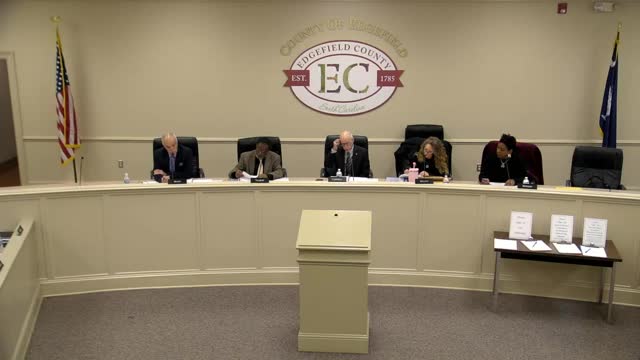Edgefield County leaders agree to move EMS funding plan into upcoming budget after public hearing
Get AI-powered insights, summaries, and transcripts
Subscribe
Summary
After a public hearing and extended discussion, Edgefield County Council directed the administrator to include an EMS funding package in the proposed fiscal-year budget for review, while exploring a mix of general-fund support, targeted millage, impact fees and outside grants.
Edgefield County Council on Jan. 7 directed the county administrator to include a multi-part plan to address emergency medical services (EMS) operations, ambulances, equipment and facility needs in the county’s proposed budget for fiscal 2025–26, after a public hearing and extended council discussion.
The move gives council time to examine funding options — including using general-fund reserves, a dedicated millage for capital, impact fees and requests to state legislators — before any final tax or millage change is proposed. Council members said the budget process, beginning in March, is the appropriate forum to refine costs and possible revenue sources.
Judge Gary Hitt, a resident who spoke at the public hearing, urged full funding for EMS, citing service volume and local responsibilities. “Every county has to have three things. They have to have an EMS, a fire department, and law enforcement,” Hitt said, and added that EMS had “over 3,800 calls for service” last year. He described EMS work that goes beyond transports, including long-standing assistance to the county coroner’s office.
Council members stressed they support funding EMS but disagreed on how to do it. One councilor proposed moving EMS operational funding into the general fund and reserving a separate EMS capital millage — “put EMS under the general fund” and create a 4-mill capital improvement EMS millage, the councilor said — arguing the county’s current unassigned fund balance could absorb operating shortfalls in the short term. The administrator and other members warned that a local ordinance requires the county to maintain a four-month reserve, limiting how much of the unassigned fund balance can be used without triggering future tax increases.
Council members also discussed other measures to reduce immediate budget pressure: pursuing state funding through local legislators, pursuing an impact-fee study (the council approved a separate resolution to send that study to the planning commission), participating in collections programs to recoup unpaid EMS bills, and exploring station space in Trenton to improve response times. One councilor said the Trenton offer could alleviate overcrowding at the current Star Road site and improve response times.
Auditor Grant Davis’s earlier presentation on county finances informed the discussion. Davis reported the general fund’s total revenues were about $21,000,000 and expenditures about $20,000,000 for the fiscal year ended June 30, 2024; fund balance totaled about $11,100,000 with roughly $7,700,000 unassigned — roughly six months of expenditures at current monthly spending levels. Davis described that level as “a really, really, really healthy place to be” relative to the county’s tax receipt cycle.
Council Chair Mr. Campbell asked whether there were objections to placing the EMS plan in the proposed budget. Hearing no objections, he directed the administrator to include EMS options in the upcoming budget so council can evaluate revenue options, cost refinements and citizen input before making a final decision.
Direction given to include EMS in the proposed budget does not, by itself, enact new taxes or change millage; it places EMS funding proposals on the budget timeline for further study and public hearings.
Clarifying details recorded in the meeting include that some EMS training requirements referenced during public comment are “roughly between 120 and 150 hours” for basic EMS certification, and that EMS previously performed body-transport duties for the coroner’s office historically but those services are now contracted out. Council and staff also referenced a facility needs study prepared by Moseley Architects and a staff cost analysis requested by council.
The council’s next formal opportunity to consider revenue changes tied to EMS will be during the March–June budget development process that precedes the July 1 fiscal year start.
